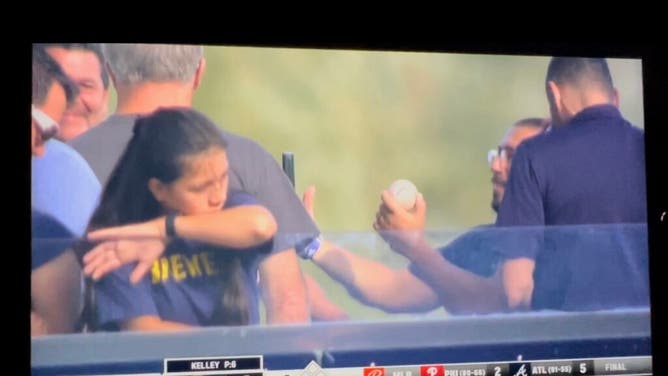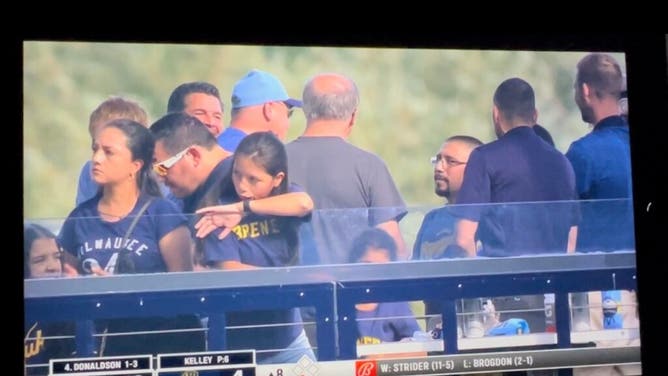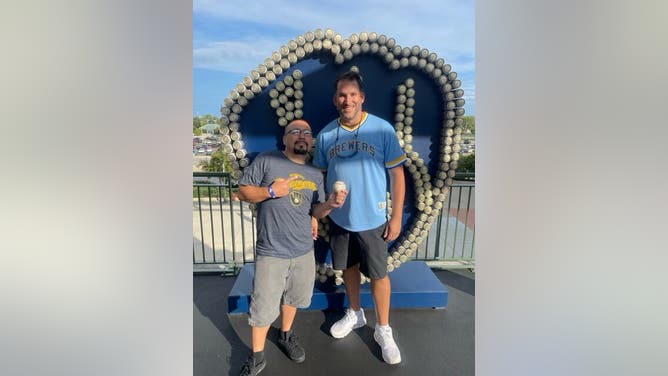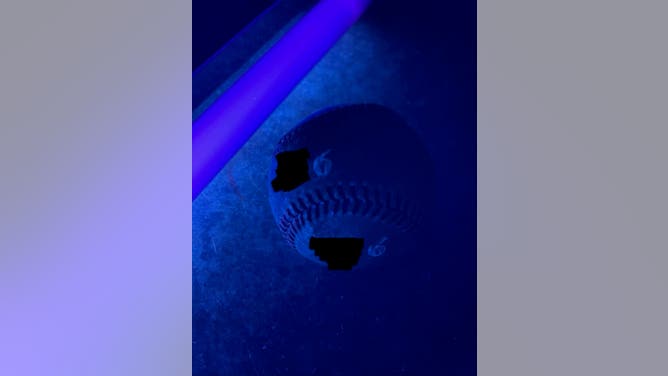OutKick Exclusive: Major League Baseball, Fan At Odds Over Authentication Of Aaron Judge 59th Home Run Ball
Bryant Junco, a Milwaukee Brewers fan who claims he has Aaron Judge's 59th home run ball, says Major League Baseball refuses to authenticate the historic ball.
The 38-year-old Junco attended the Brewers-Yankees game Sept. 18 at American Family Field, where Judge hit the historic home run. The Yankees slugger's 59th blast in 2022 set the American League single-season record for a right-handed hitter. Judge has since hit 60 and 61, which tied the all-time AL mark.
Junco did not originally possess the 59th ball. He bought it for $1,500 from Brewers fan Peter Sierra, who caught the ball off a ricochet. Sierra immediately was approached by MLB or Yankees representatives with an exchange offer, but Sierra refused, according to Junco. That's when Junco offered to purchase it on the spot in front of the MLB personnel.
MLB offered Sierra four autographed Judge baseballs and four autographed Yankees hats in exchange for the 59th home-run ball, according to Junco.
OutKick has reached out to Sierra for comment and has not received a response.
Brandon Steiner of Collectible XChange tells OutKick that an authenticated 59th home-run ball could be worth anywhere from $25,000 to $50,000. Steiner estimates the four signed baseballs and hats is worth a few thousand dollars at best.
'You Want The Deal Or Not, Bro?'
Junco, who works as an orthopedic technician at a children's hospital in Milwaukee, attended the Sept. 18 Brewers-Yankees game by himself. When Judge hit No. 59, the ball landed in the Miller Lite Landing area in left-center field and bounced off the concrete. ("It still has the scuffing on it," says Junco.) The ball ricochetted off a railing where Sierra grabbed it.
Junco was sitting nearby and immediately walked over to Sierra.
Someone who Junco believes was either a Yankees or MLB staffer, as well as two Brewers security guards named Matt and Denny, were already speaking with Sierra as a crowd began to form around them.
Sierra declined the Yankees offer of the autographed balls and hats. The representatives allegedly also told Sierra he couldn't meet Judge because of "Covid protocols." (Judge did meet with the fan who caught his 60th home run just a few days later though.)

TV footage from Bally Sports shows Sierra with the ball. (Bally Sports Wisconsin)
Negotiations continued until a random Brewers fan shouted out he would give $1,000 to Sierra for the ball. That's when Junco jumped in and offered to pay Sierra $1,500 via Venmo on the spot.

Sierra being given offers by MLB or Yankees personnel in exchange for the baseball. (Bally Sports Wisconsin)
It was then that the MLB or Yankees representative became visibly agitated and frustrated.
"You want the deal or not bro?! I gotta go! Once you leave the stadium it’s just like a foul ball. We won’t authenticate it!” Junco claims the representative threatened.

Peter Sierra, left, and Bryant Junco, after Junco purchased the ball for $1,500. (Photo courtesy of Bryant Junco)
Once Junco paid Sierra for the ball and it was exchanged, the representative and security walked away. They did not attempt to make a deal with Junco nor offer to have someone authenticate the baseball according to Junco.
Yankees, MLB Won't Help Junco With Aaron Judge's 59th HR Ball
Junco shared with OutKick photos of the 59th home run ball. Under a black light, markings on the ball are visible that can't be seen under regular light.

Aaron Judge's alleged 59th home-run ball is seen here under a black light. OutKick digitally added black marks to stop counterfeits. The numbers "6" or "9" are visible under a black light. (Photo by Bryant Junco)
On Sept. 25, one week after the 59th homer game in Milwaukee, Junco flew to New York City unannounced in an effort to meet with MLB or Yankees officials.
His first stop was Yankees Stadium for the Red Sox-Yankees game. Junco spoke with security in the Yankees executive lobby. They said nobody from the Yankees or the authenticators on-hand would be available to talk to him. Guest relations? The same thing.
Junco took the escalator up to the Yankees Museum in Section 210. It regularly has game-used memorabilia that the team owns or is loaned. Junco spoke with museum curator Brian Richards. Once again, Junco claims he was turned away.

Junco's ticket stub from the Sept. 18 game and the alleged 59th home-run ball. (Photo by Bryant Junco)
The next day Junco went to Major League Baseball's offices in Manhattan with the baseball and a black light that identified the hidden markings. He showed it to Sean O'Neall, head of MLB's building security. O'Neall immediately called Elena Carrington, MLB Senior Manager of Facilities and Intelligence, and handed his cell phone to Junco.
Carrington said that if Junco would leave the ball she would personally forward it to the authentication department. When Junco asked how he would get the ball back once MLB examined it, Junco says Carrington responded, "You won't. It becomes MLB property."
OutKick reached out to Major League Baseball's Authentication Program. A representative said their process is "agnostic," and that if a fan gave them something they would return it, which contradicts what Carrington told Junco.
Junco says he still has not directly heard from the MLB or the Authentication Program. An email sent to Carrington by OutKick regarding her conversation with Junco has gone unanswered.
Junco: 'Doesn't Seem Right'
According to a SportsCenter report by ESPN's Michele Steele, the Yankees are in possession of the balls from Aaron Judge's 56th, 57th, 58th and 60th home runs after fans initially caught them. (The 61st landed in the Blue Jays bullpen.) The 20-year-old fan who caught 60 traded it for a few signed baseballs and a bat, along with a meet-and-greet with Judge.
MLB told OutKick that the 60th and 61st home run balls have a third covert marking that can only be seen with MLB proprietary technology. No home run balls before that—including 59—have that third covert marking, meaning they can't be authenticated, according to MLB.
Junco continues to be frustrated that if a fan doesn't give into the pressure of handing over a ball or sports memorabilia right on the spot, that others may go through the same issue.
He also wants to know if the black light numbers on the ball can be traced back to Judge's at bat to help authenticate it.
"Are the Yankees going to have a display case of home run balls 56 thru 61 and just have a blank spot for 59?" Junco asked. "How is that good for the historical integrity of the game?"
He said that he's willing to travel back to New York City to have the ball authenticated, but that it's not leaving his sight, especially after his conversation with Carrington.
Ultimately, whether the ball gets authenticated or not, Junco is undecided on whether he even sells it.
"I have a 1-year-old son and may want to pass it down through generations," Junco said. "But not even being able to have the chance to cash in because MLB is stonewalling me doesn't seem right."
OutKick will add to this story as more information becomes available